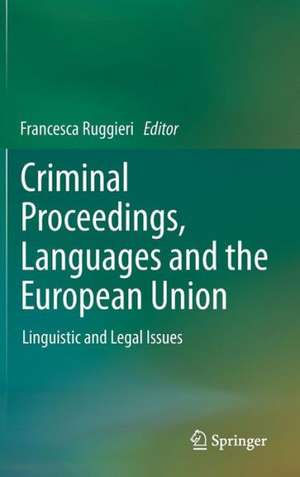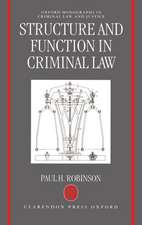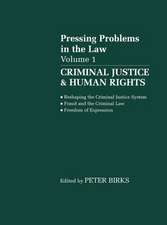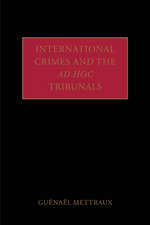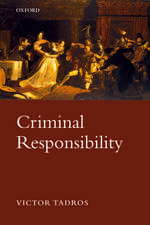Criminal Proceedings, Languages and the European Union: Linguistic and Legal Issues
Editat de Francesca Ruggierien Limba Engleză Hardback – 11 sep 2013
| Toate formatele și edițiile | Preț | Express |
|---|---|---|
| Paperback (1) | 942.31 lei 6-8 săpt. | |
| Springer Berlin, Heidelberg – 26 aug 2015 | 942.31 lei 6-8 săpt. | |
| Hardback (1) | 948.29 lei 6-8 săpt. | |
| Springer Berlin, Heidelberg – 11 sep 2013 | 948.29 lei 6-8 săpt. |
Preț: 948.29 lei
Preț vechi: 1156.45 lei
-18% Nou
Puncte Express: 1422
Preț estimativ în valută:
181.47€ • 188.39$ • 151.32£
181.47€ • 188.39$ • 151.32£
Carte tipărită la comandă
Livrare economică 22 martie-05 aprilie
Preluare comenzi: 021 569.72.76
Specificații
ISBN-13: 9783642371516
ISBN-10: 3642371515
Pagini: 300
Ilustrații: IX, 238 p.
Dimensiuni: 155 x 235 x 20 mm
Greutate: 0.53 kg
Ediția:2014
Editura: Springer Berlin, Heidelberg
Colecția Springer
Locul publicării:Berlin, Heidelberg, Germany
ISBN-10: 3642371515
Pagini: 300
Ilustrații: IX, 238 p.
Dimensiuni: 155 x 235 x 20 mm
Greutate: 0.53 kg
Ediția:2014
Editura: Springer Berlin, Heidelberg
Colecția Springer
Locul publicării:Berlin, Heidelberg, Germany
Public țintă
ResearchCuprins
The Lisbon Treaty, mutual legal assistance and judicial cooperation.- Multilingualism and legal acts.- The Treaty of Lisbon: constitutional provisions with an indefinite content.- Language and the environment: ascending and descending circulation of polysemantic words.- Language and criminal proceedings. Some case-studies.
Textul de pe ultima copertă
The book “Criminal proceedings, languages and the European Union: linguistic and legal issues” – the first attempt on this subject – deals with the current situation in the jurislinguistic studies, which cover comparative law, language and translation, towards the aim of the circulation of equivalent legal concepts in systems which are still very different from one another. In the absence of common cultures and languages, in criminal procedure it is possible to distinguish features that are typical of common law systems and features that are typical of civil law systems, according to the two different models of adversarial and inquisitorial trials. Therefore, the most problematic challenges are for the European Union legislator to define generic measures that can be easily implemented at the national level, and for the individual Member States to choose corresponding domestic measures that can best implement these broad definitions, so as to pursue objectives set at the European level.
In this scenario, the book assesses the new framework within which criminal lawyers and practitioners need to operate under the Lisbon Treaty (Part I), and focuses on the different versions of its provisions concerning cooperation in criminal matters, which will need to be implemented at the national level (Part III). The book analyses the issues raised by multilingualism in the EU decision-making process and subsequent interpretation of legal acts from the viewpoint of all the players involved (EU officials, civil, penal and linguistic lawyers: Part II), explores the possible impact of the EU legal acts concerning environmental protection, where the study of ascending and descending circulation of polysemantic words is especially relevant (Part IV), and investigates the new legal and linguistic concepts in the field of data retention, protection of victims, European investigation orders and coercive measures (Part V).
In this scenario, the book assesses the new framework within which criminal lawyers and practitioners need to operate under the Lisbon Treaty (Part I), and focuses on the different versions of its provisions concerning cooperation in criminal matters, which will need to be implemented at the national level (Part III). The book analyses the issues raised by multilingualism in the EU decision-making process and subsequent interpretation of legal acts from the viewpoint of all the players involved (EU officials, civil, penal and linguistic lawyers: Part II), explores the possible impact of the EU legal acts concerning environmental protection, where the study of ascending and descending circulation of polysemantic words is especially relevant (Part IV), and investigates the new legal and linguistic concepts in the field of data retention, protection of victims, European investigation orders and coercive measures (Part V).
